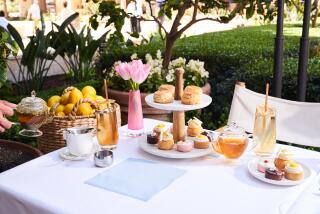Bitter End to London’s Tea Auctions
LONDON — Along the Thames, a pale winter sun is warmed by exotic names from tropical places. Corramore from north India, Nandi from Kenya, Tole from Cameroon, Tora and Teza from Burundi.
In an auction room, about 30 people hear the names fly by. Occasionally one piques interest and competitive bidding. Most are dismissed by silence.
History is under the gavel here. Tea auctions, held regularly by the river since 1679, are being scrapped in London, for centuries the world’s tea capital.
Modern market forces are ending the great London Tea Party, but consumers won’t notice the change. And in the tea trade itself, Thames-side nostalgia is outweighed by new-era maturity among former colonial countries grown independent in tea as well as government.
“When I started in the ‘50s, the auction took three days every week, most producers consigned their teas here, and London controlled the price structure,” tea broker Chris Bergstrom said. “Now the romance is gone.”
Tea was a profitable staple of Britain’s global empire and one of its paramount symbols, never more so than at that 1773 party in Boston Harbor. Back when clipper ships raced home from China and India with the freshest, brightest and crispiest leaves of a new season’s crop, London was the only tea market in the world, broker Edward Foster noted at his riverside office.
Once, more than 20 selling brokers ran London auctions. Now, as weekly auctions wind to a close this coming summer, just two auctioneers remain.
About half a dozen buyers turned up one morning this week to bid--or, mostly, not bid--on about 400,000 pounds of tea in distant warehouses. Most of the buyers were topping off supplies bought elsewhere by big international tea firms.
As a market, London has long since been dwarfed by its former colonies. In an average week, about 13.2 million pounds of Ceylon tea are sold at auction in Colombo, Sri Lanka, alone, broker Bergstrom noted.
Regional centers, including a huge African market in Mombasa, Kenya, auctions in half a dozen Indian cities and one in Jakarta, Indonesia, have all grown up since World War II.
They have reduced London’s importance without diminishing tea as Britain’s lifeblood: Three times as much tea as coffee is still drunk here, although the coffee is worth more.
*
Volumes have slipped, but Britain remains the world’s largest importer of tea and the second-largest consumer after India, in a global market that is increasingly diffuse in both production and consumption.
Over the past two decades, for example, tea consumption has more than doubled in Pakistan and countries of the former Soviet Union.
Germans and Japanese spend the most on each cup, insisting on the highest-quality teas.
Americans, who favor their tea with ice, are drinking light blends from relative tea newcomers such as Argentina, Brazil and Ecuador, Foster said.
The supply of tea to British brokers and blenders will be unaffected by the death of the auctions, Bergstrom said, because it is easier than ever for them to buy tea directly from producers or through the regional markets.
Says a statement from the Tetley Group, one of the world’s largest tea-buying companies: “It is always sad to see the end of a tradition. However, the tea trade is a dynamic one, and this move reflects the change in world patterns of supply and demand.”
Does change leave Britain with the dregs? That’s not how the leaves are being read along the Thames.
“The knowledge of tea doesn’t lie in knocking a hammer on a piece of wood,” Foster said. “The most knowledgeable tea people in the world today are still in London.”
Buyers, blenders, tasters and traders, for whom verbal contracts are still the norm, work today near quays where jostling crowds once greeted pungent and mysterious chests unloaded from tall ships. They are an enduring bridge between the Britain where new-fashion “one tall skinny vanilla cap no whip” is shadowed by resilient tradition: “Cuppa tea, luv?”
More to Read
Inside the business of entertainment
The Wide Shot brings you news, analysis and insights on everything from streaming wars to production — and what it all means for the future.
You may occasionally receive promotional content from the Los Angeles Times.








